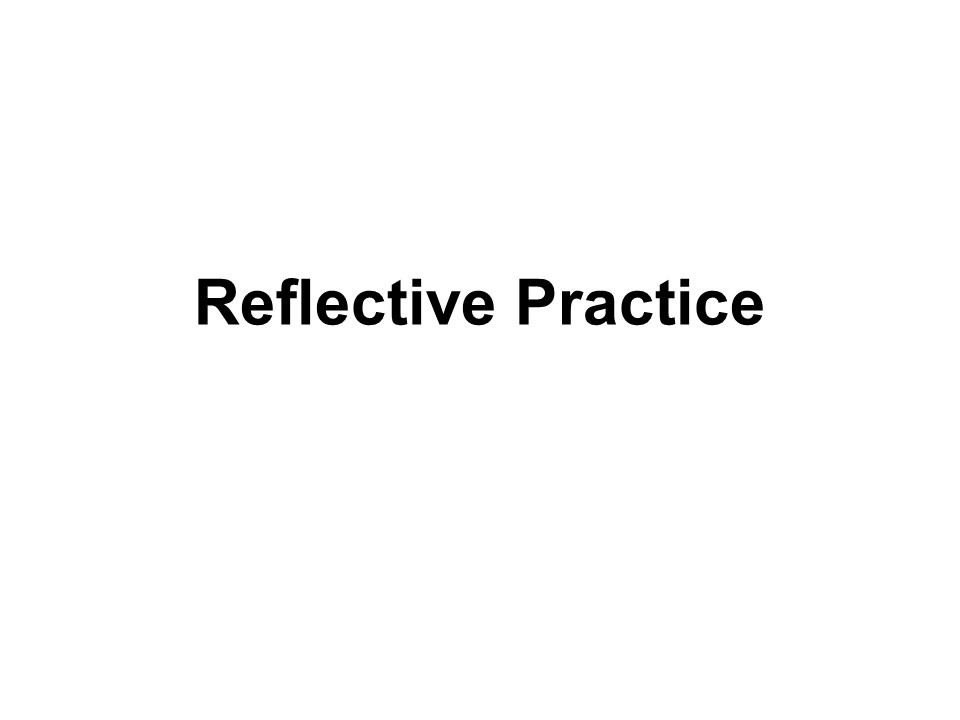Reflective Practice - PowerPoint PPT Presentation
Title: Reflective Practice
1
Reflective Practice
2
reflective practice
Reflection is what allows us to learn from our
experiences it is an assessment of where we have
been and where we want to go next. Kenneth Wolf
3
Definition
- "a set of abilities and skills, to indicate the
taking of a critical stance, an orientation to
problem solving or state of mind" (Moon,1999
63).
4
Kolb's Experiential Learning Theory
5
Why Reflect?
- Reflection helps learners to
- understand what they already know (individual)
- identify what they need to know in order to
advance understanding of the subject (contextual)
- make sense of new information and feedback in the
context of their own experience (relational) - guide choices for further learning
(developmental)
6
Learning Cycle
7
Personal Reflections
- Priorities?
- Time management?
- Motivation?
- Direction?
- Strengths / Weaknesses?
- Identifying problems
- Developing an action plan
8
Reflection involves
- Slowing down..
- Pause to examine, analyse, inquire about
complexities of life - active choice to pause and examine not passive
process - Cognitive processes analysis, synthesis,
evaluation - Many different forms and functions many ways to
reflect
9
Reflecting A State of Mind
- Learning Styles show preferences
- not everyone is as reflective some more action
oriented etc - Reflection can be encouraged by
- Structuring in time schedule
- Using journal, diary etc
- realistic assessment gives strength
10
Experiential learning theory
- It is not enough just to do, and neither is it
enough just to think. - Learning from experience must involve links
between the doing and the thinking
11
How to become a reflective learner
- 1. Establish objectives
- 2. Recognise current level of performance
- 3. Plan how to meet targets
- 4. Use effective time management
- 5. Use feedback and support
- 6. Monitor and review progress
- 7. Critically reflect on own learning
12
Recognising Domains of Learning
- Bloom's Taxonomy
- 1.Cognitive Domain knowledge based
- 2. Psychomotor domain skills based
- 3. Affective domain attitudes, feelings
13
Cognitive domain
- lowest level knowledge recall of data
- comprehension
- Application
- Analysis
- Synthesis
- Highest level - Evaluation critiques,
judgements about value of ideas
14
Relevance to Career Path
- Employers look for
- self-reflective people with
- Skills of analysis,
- Interpersonal skills,
- self development,
- critical reflection on performance
15
Setting Objectives
- What is an objective?
- An objective is a clearly defined target that has
the following characteristics - 1. SPECIFIC
- 2. MEASURABLE
- 3. ACTION-BASED
- 4. REALISTIC
- 5. TIME-BOUND
16
Professional Development Plan (PDP)
17
What is a PDP?
- A way of recording, reflecting on and writing
about the practical outcomes of experiences - a personalised record of one's career or
experiences - a loose-leaf folder in which you keep the written
record of your career - need not be restricted to written materials
18
Why keep a PDP?
- It provides you with a record of your
professional development. - useful as a means of updating a Curriculum Vitae
- It personalises learning by encouraging the
person to own and value their development and
achievements. - It enables the individual to demonstrate
coherence in their professional development and
plan for the future
19
The Assignment
- Part A In a session with your SSF tutor to
discuss the feedback from your semester one work,
What am I good at? What am I not so good at?
What practices I want to continue What areas I wish to improve in
Select a higher-level academic skill you wish to
develop and outline a plan for development.
20
The Process
- (a) How are you going to develop the skill?
- Eg. use Semester 2 assignment(s) as the
vehicle - (b) What is the time frame for this development?
- Eg. up until end of semester and beyond
- (c) How are you going to check whether you have
been successful at developing this skill? - Eg. Obtain continuous feedback from tutors,
peers, test yourself using past papers etc
21
Monitoring the Process
- PART B.
- WORKING ON YOUR PERSONAL/ACADEMIC DEVELOPMENT
PLAN. - On this sheet, keep a diary of your development
work and note any issues or thoughts that occur
to you whilst engaged in it. Include any changes
you make to your personal/academic development
plan during this time.
22
Reflecting on the PDP
- PART C.
- Do you feel you have succeeded in your
personal/academic development? If so, why? If
not, why not? - What changes would you make to the
Personal/Academic Development Plan if you had to
do it again? - What is the main thing you learnt from the
process? - What other things have you learnt from the
process? - What ideas have you had for developing other
areas of your own practice?
23
Marks will be gained for
- Evidence of reflection on the feedback from
semester 1 - A detailed and in-depth assessment of academic
strengths and weaknesses (including higher-level
cognitive skills) - A clear plan of action to support the development
of your chosen skill - Evidence of a systematic and continuous attempt
to improve the chosen skill - A detailed evaluation of the degree of success of
your development plan.
24
Bibliography
- Kolb, D. (1984). Experiential learning
experience as the source of learning
development. Englewood Cliffs, NJ Prentice Hall.
- Moon. J. (1999a) Learning Journals A handbook
for Academics, Students and Professional
Development. Kogan Page, London. - Moon, J. (1999b) Reflection in Learning and
Professional Development Theory Practice.
Kogan Page, London

